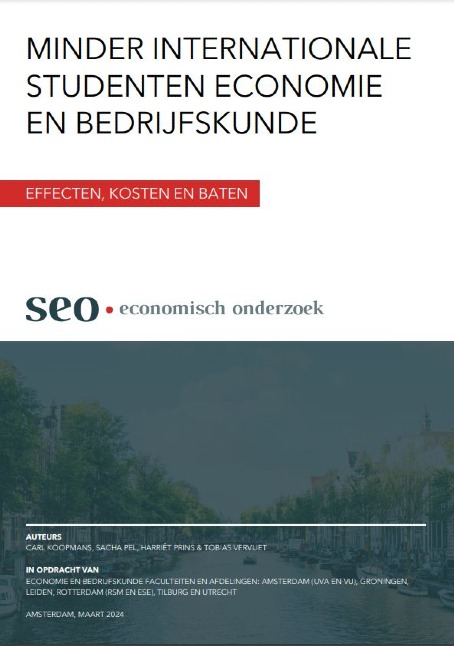Bedrijven zeer ongerust over gevolgen vermindering Instroom van Internationale Studenten
Grote bedrijven zijn zeer ongerust over plannen van een aantal politieke partijen in de Tweede Kamer [1] om veel minder Engelstalig onderwijs te geven en het aantal internationale studenten drastisch te verlagen. Dat blijkt uit onderzoek van SEO Economisch Onderzoek in opdracht van Economie- en Bedrijfskunde faculteiten.
In het onderzoek is gesproken met vertegenwoordigers van 20 bedrijven en brancheverenigingen. Onder deze bedrijven bevonden zich onder andere Philips, Unilever, Friesland Campina, Tom Tom, Ayden en EY. Volgens de meeste bedrijven zijn internationale studenten juist nu heel hard nodig om de economie draaiende te houden, gezien de huidige krappe arbeidsmarkt en de toenemende vergrijzing. Enkele bedrijven overwegen zelfs om buiten Nederland verder te groeien, niet alleen in de ICT en techniek, maar ook in de (bedrijfs)economische banen, zoals accountants, financial controllers, logistieke managers, productmanagers, data analisten, etc.
Engelstalig onderwijs essentieel voor internationale kenniseconomie
Eén van de bedrijven geeft aan dat minder Engelstalig onderwijs Nederland 30 jaar terugzet in de tijd. Engelstalig onderwijs aan economen en bedrijfskundigen is voor bedrijven juist noodzakelijk, omdat de voertaal bij heel veel grote internationaal opererende bedrijven Engels is en de omgeving internationaal is. Engelstalig onderwijs is dan ook van groot belang voor Nederlandse afgestudeerden. Nederland is geen eiland, maar onderdeel van een internationale kenniseconomie. Bedrijven zijn daarnaast ook bezorgd over de nadelige werking van de maatregelen op de kwaliteit van het onderzoek. Dit vermindert de aantrekkingskracht van Nederland voor bedrijven. De geuite zorgen in het rapport passen bij de kritische opmerkingen van onder andere de CEO’s van ASML en NXP [2].
VNO-NCW is ook om een reactie gevraagd. Ingrid Thijssen de voorzitter van VNO-NCW: “Ik ben blij dat dit rapport er is. Het in voldoende mate aan kunnen trekken van internationaal talent, zeker in technische en bedrijfskundige studies en beroepen, is extreem belangrijk voor het toekomstige verdienvermogen van ons land. Er is wereldwijd een strijd om talentvolle mensen gaande. Het is belangrijk dat we ons dat realiseren.”
Inkomsten
In het onderzoek komt verder naar voren dat internationale studenten goed zijn voor de schatkist. De extra belasting- en premieopbrengsten van internationale afgestudeerden, die in Nederland blijven zijn (ook na aftrek van hun gebruik van zorg en sociale zekerheid) groter dan de uitgaven van de overheid voor internationale studenten. De baten zouden volgens het onderzoek nog groter worden als meer studenten hier na hun studie blijven. Nu blijft zo’n 30 – 40%. Bedrijven zien mogelijkheden om de blijfkans van internationale studenten te verhogen via stages, en zijn hier al actief mee bezig. Universiteiten zien ook mogelijkheden om de blijfkans te verhogen, onder andere door de Nederlandse taalvaardigheid van internationale studenten te vergroten.
Het SEO-onderzoek laat ook zien dat het verminderen van internationale studenten nauwelijks effect heeft op de huizenprijzen in Nederland. De reden hiervoor is dat de tekorten en wachtlijsten bij studenten relatief beperkt zijn vergeleken met bijvoorbeeld sociale huurwoningen. Bovendien zijn de woonwensen van studenten (kleine kamers), heel anders dan die van bijvoorbeeld gezinnen.

Decanen: ”Neem bedrijfsleven serieus.”
De decanen van de deelnemende faculteiten vinden dat het onderzoek van SEO duidelijk aangeeft, dat Nederland internationale opleidingen, studenten en staf nodig heeft. Ook de Onderwijsraad geeft aan dat: “Ontwikkelingen in de wereld en in de Nederlandse samenleving vragen om internationalisering van het onderwijs”. Engelse taalvaardigheid is erg belangrijk voor Nederlandse studenten Economie en Bedrijfskunde. Hier verdient Nederland een groot deel van haar geld mee: CPB laat zien dat twee derde van het inkomen dat Nederlandse werknemers verdienen met wereldwijde productie en handel in goederen uit professionele dienstenactiviteiten komt (o.a. bedrijfskundigen, marketing en financiële professionals) [3]. De reacties van het bedrijfsleven moeten daarom heel serieus worden genomen, omdat de aantrekkelijkheid van Nederlands en structurele economische groeimogelijkheden onder druk komen te staan.
Knelpunten oplossen
Tegelijkertijd beseffen de decanen in lijn met de visie van de Universiteiten in Nederland (UNL), dat de groei van de internationale studenteninstroom ook tot knelpunten leidt. Het financieringsmodel in het hoger onderwijs en ontwikkelingen zoals de Brexit hebben tot een grote groei van het aantal internationale studenten geleid. Deze knelpunten moeten worden opgelost en daar willen de verschillende faculteiten ook aan meewerken. Veel faculteiten bieden momenteel al Nederlandstalige opleidingen bedrijfskunde en economie aan en, zoals voorgesteld door UNL, kan met behulp van Nederlandstalige en Engelstalige varianten, gestuurd worden op het aantal internationale studenten. Daarvoor is het wel nodig dat universiteiten de wettelijke mogelijkheid krijgen om een numerus fixus op een Engelstalige variant van een opleiding te zetten. Die mogelijkheid is onlangs door de Tweede Kamer gecreëerd en de decanen hopen dat de Eerste Kamer daar nu ook mee instemt.
Dit komt tegemoet aan een observatie van een van de geïnterviewde bedrijven dat bij grote opleidingen de kwaliteit onder druk kan komen te staan. De decanen hebben ook zorgen over de kwaliteit van het onderwijs wanneer de plannen van de politieke partijen geïmplementeerd moeten worden. Voor de sector Economie & Bedrijfskunde is het namelijk zeer moeilijk om voldoende gekwalificeerd Nederlandstalig personeel te vinden. Wanneer meer colleges in het Nederlands gegeven moeten worden vraagt dit om een grote en structurele tijd en financiële investering om internationale docenten Nederlands te leren nu en in de toekomst. Daarbij zal het werven van talent moeilijker worden. “Op dit moment ervaren we helaas al dat onze internationale collega’s zich minder welkom voelen in Nederland. Dit betreuren we zeer”, aldus de decanen.
De welvaart in Nederland hangt sterk af van de inrichting van onze instituties en bedrijven. De decanen Economie & Bedrijfskunde hebben daarom een strategie ontwikkeld om bij te dragen aan maatschappelijke uitdagingen, zoals digitalisering, een gezonde samenleving, de krappe arbeidsmarkt en een duurzame economie.
Kortom: om relevant te zijn en onze studenten goed voor te bereiden op de Nederlandse arbeidsmarkt is Engelstalig onderwijs essentieel [4].
Referenties:
[1] https://www.tweedekamer.nl/(...)00564&did=2024D01329
[2] https://www.rtlnieuws.nl/(...)ratie-china-politiek; https://fd.nl/(...)ndanks-dip-chipmarkt
[3] https://www.cpb.nl/(...)le-goederenproductie
[4] Zie ook onze impact agenda “The Challenges of Transition”: https://zenodo.org/records/10019977
Meer nieuws
-
09 december 2025
Zijn robots de oplossing?
-
10 november 2025
Decentralisatie van de jeugdzorg
